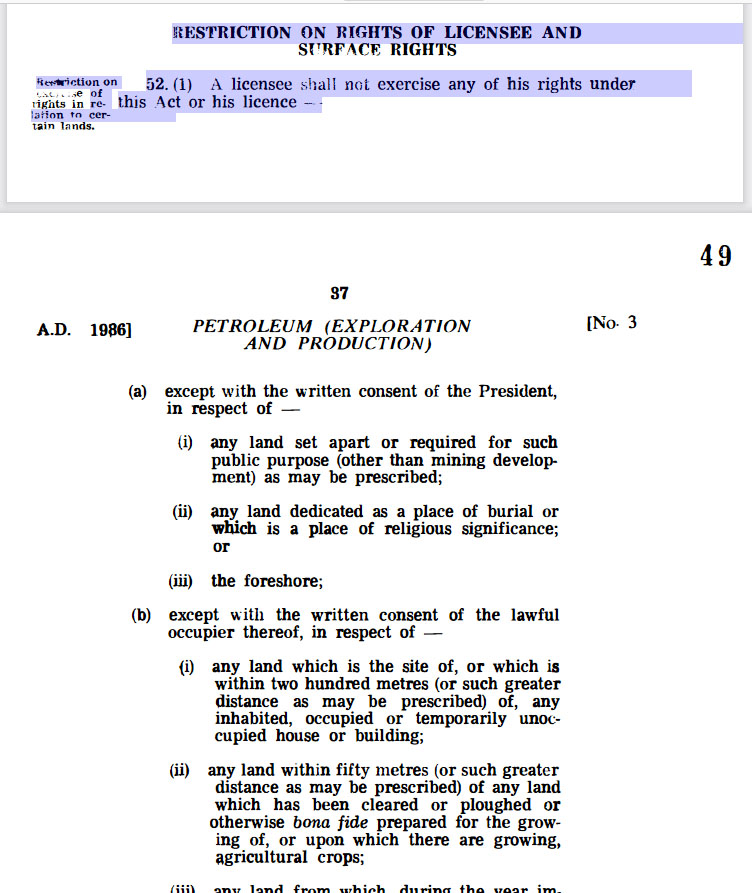Tomorrow, the PPP/C government will present to Parliament an amendment to the Petroleum (Exploration and Production) Act, as it seeks to pave the way for the smooth execution of the gas to shore project and ExxonMobil’s laying of fibre optic cables.
“These works contemplated in the Bill are necessary for the advancement of our country’s welfare. Every oil producing country, has had to pass these types of legislation. Trinidad and Tobago has an entire pipeline act for example. And since the advent of the internet, countries have had to pass laws regulating the running of fibre optic, submarine and terrestrial cables along oceans riverbeds and across lands,” Minister of Legal Affairs and Attorney General Anil Nandlall SC, told Stabroek News yesterday.
“We are simply updating our laws to bring it in conformity with modern developments sweeping the global landscape,” he added.
Asked if the legislation targets and paves the way for the hiccup-free execution of the current Wales Gas to Shore Project, Nandlall replied, “Yes, obviously, as well as it allows for ExxonMobil to monitor their activities carried on at the drilling sites with a concomitant ability of the state to oversee the activities on the rigs as well because the state will be getting a feed off of the cable.”
Government recently faced a setback in the courts in relation to leased lands at Wales that might be in the path of the proposed gas to shore pipeline. The amendment to the Act could see the exercising of compulsory acquisition of lands which are deemed to be important to the project. Currently, ExxonMobil is forging ahead with the laying of a US$50M fibre optic cable under its ‘Fibre Optic Enablement Project,’ where it plans to connect the onshore and offshore operations so that there can be real-time oversight. Nandlall said that the government will also be given a feed and it will also be able to independently monitor works.
In addition, the company is also leading the Wales Gas to Shore Project, scheduled to bring associated gases to shore for processing into natural gas for domestic energy uses.
The Bill – the Petroleum (Exploration and Production) (Amendment) Bill, No.14 of 2021, seeks to amend section 52 of the Principal Act Cap. 65:04. The amendment inserts a proviso to subsection (l)(b) (i) and (ii) to exempt State land, Government land, land wholly owned by State entities or in which the controlling interest is vested in the State and any land identified by law or on a plan for reserves from the restriction of section 52(1) (b).
Section 52 deals with the restriction on the rights of the licensee and surface rights. Section 52 (1) (b) (i) and (ii) pertain to any land which is the site of, or which is within two hundred meters (or such greater distance as may be prescribed) of, any inhabited, occupied or temporarily unoccupied house or building and any land within fifty metres (or such greater distance as may be prescribed) or any land which has been cleared or ploughed or otherwise bona fide prepared for the growing of, or upon which there are growing, agricultural crops.
The bill also seeks to amend section 52 by inserting new subsections (2A) and (2B). Subsection (2A) provides that the Minister may obtain written consent from any landowner or lawful occupier of private land. Currently, only a licensee may obtain written consent from the lawful occupier of private land.
Subsection (2B) provides that a licensee may land, install or operate any pipelines or submarine, fibre optic or terrestrial cables or similar infrastructure. These infrastructural activities may only be done on State land, Government land, land wholly owned by State entities or in which the controlling interest is vested in the State and any land identified by law or on a plan drawn and approved in accordance with any law for reserves. This is necessary as the Principal Act is premised on onshore development with all of its accompanying heavy infrastructural works.
“Consequently, subsection (2) was also amended to provide that any instrument of consent obtained under subsection (l)(b) or subsection (2A) may be given unconditionally or subject to such conditions as are specified in that instrument,” the explanatory memorandum of the bill states. “Overall, the amendment of section 52 ensures that the Government has oversight over the exercise of the licensee’s rights over private land. Accordingly, the amendment further strengthens and protects private proprietary interests as enshrined in Article 142 of the Constitution of Guyana,” it adds.
This is the government’s first legislative amendment to the existing oil and gas architecture in the year that it has been in office.
Nandlall explained the reason for government’s prioritising of the Bill.
“From the inception, it must be noted that the first principle prioritised and recognised in the Bill is the sanctity of private property protected by our constitution being recognised. This bill seeks to ensure that if that pipeline or cable runs on any private property, that private property, will be acquired for public purposes and the owner will be paid compensation at current market price,” Nandlall said.
He continued, “Secondly, every effort will be made to ensure that either these cables or the pipeline runs along public lands.”
Significantly, according to Nandlall, the Bill gives the Minister as opposed to the licensees the power to ensure that the intendment of the Bill is realised. “That is to say that the Minister now has the power to negotiate with the private property owners who may be affected. We are not leaving it up to the licensees, the government will undertake that responsibility to ensure that our patrimony is protected,” he contended.
The Attorney General said that all actions were taken “In protection of Guyana’s interest. This is the type of legislation we promised.”
“Legislation that is not only necessary to modernise our legislative architecture but legislation that can also ensure the public interest is protected,” he added.






